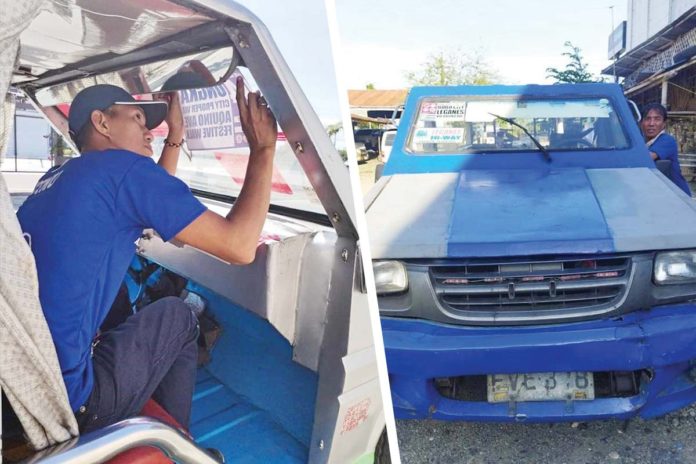
BY GEROME DALIPE IV
ILOILO City – There’s no stopping the city government from implementing the enhanced Local Public Transport Route Plan (LPTRP).
“We are almost ready,” said retired Police Colonel Uldarico Garbanzos, head of the city’s Traffic Management Unit.
Garbanzos recently met with officials of the Land Transportation Franchising and Regulatory Board (LTFRB) Region 6, transport cooperatives, and Iloilo provincial government to discuss issues hounding the program.
He added they started installing stickers on consolidated jeepneys to identify them during the enforcement.
Joint enforcement units from various state agencies and the city government will be conducting operations against unconsolidated jeepneys still plying the streets, said Garbanzos.
He said they anticipate the volume of passengers in public terminals to swell, hence, they are coordinating with the LTFRB, the provincial government, and other concerned government agencies.
Atty. Salvador Altura Jr., LTFRB-6 officer-in-charge, echoed Garbanzos’ statement, saying the LPTRP was adopted through the passage of an ordinance by the city government.
Thus, Altura stressed that delaying the route plan’s implementation would affect suspending also the ordinance.
“The LPTRP is being implemented by way of an ordinance. So if its implementation is deferred, it should also have to suspend the ordinance,” said Altura.
He noted that the ordinance is being implemented and that LTFRB is merely acting in coordination with the local government unit in implementing it.
The PUV modernization program is implemented through a joint Department Order between the Department of the Interior and Local Government and the Department of Transportation (DOTr), the LTFRB-6 chief stressed.
For his part, Mayor Jerry Trenas said he approved the request of the provincial government to allow first-town jeepneys to enter the city during the implementation of the enhanced route plan.
Councilor Romel Duron earlier urged the Department of Transportation (DOTr) to postpone the implementation of the city’s route plan.
In his privileged speech during the City Council’s session last week, Duron cited the lack of proper mechanisms, training, and government support for the transport cooperatives.
While the Land Transportation Franchising and Regulatory Board (LTFRB-6) in Western Visayas reported a 72.2 percent franchise consolidation rate, the councilor said the transport coop officials told him about their dismal state under the fleet management system.
In Iloilo City, the DOTr approved 25 rationalized routes out of the original 35 routes before the approval of the LPTRP.
Out of 2,535 traditional jeepneys in the city, the DOTr authorized 1,782 modern jeepneys to ply these 25 approved rationalized routes comprising old and new routes.
Duron said the 1,782 have been allocated to 14 transport cooperatives and two corporations.
The transport cooperatives were given only one year to comply with the required number of allocated mini-buses.
“But until now, there are only 520 modernized units operating in Iloilo City. So that’s more or less than one-third of modern units operating,” said Duron.
Officials of transport cooperatives reportedly sought the assistance of Duron because of the internal conflicts hounding the transport coops.
These include management style, financial matters, and lack of proper training in operating under a fleet management system.
“I think probably half (of transport cooperatives) are successful and the other half are not. But in due time, the rest will go bankrupt because of bad management,” said.
Duron said the trainings provided by the Office of the Transport Cooperatives (OTC) and the Cooperative Development Authority (CDA) were not enough to fully equip them to manage fleet units.
As one of the 10 components of the modernization program, consolidation will now allow juridical entities such as these transport corporations and cooperatives access to fresh capital needed to buy modern jeepneys estimated at P2.8 million per unit.
State-owned Land Bank of the Philippines (LBP) and the Development Bank of the Philippines (DBP) received P2.2 billion from the national budget during the term of former president Rodrigo Duterte.
The banks set the above funds as loan facilities for qualified transport entities as subsidies for “PUV owners when applying for loans to replace old public utility jeepneys with more efficient PUVs.”
Through consolidation, the LTFRB stressed that PUV units would be allocated equally to rationalized routes to prevent competition among drivers over the same route.
Under the program, drivers and operators are promised stable, sufficient, and dignified livelihoods while commuters get to their destinations quickly, safely, and comfortably.
The agency also said the program features regulatory reform and sets new guidelines for the issuance of franchises for road-based public transport services.
Under the program, the local government units are empowered to draft their route planning considering they are more versed in the terrain and passenger demand within their respective territorial jurisdiction.
Essentially, units originally plying for these routes will be considered “colorum” vehicles starting May 1.
Chairman Teofilo Guadiz III announced that unconsolidated jeepneys have 15-day leeway to ply their routes before the government starts impounding their vehicles.
The LTFRB will summon those who failed to consolidate and will be required to explain why they refused to participate in the government-sanctioned modernization program./PN





